25 Points: Crystal Eaters
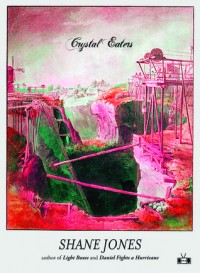 |
Crystal Eaters
by Shane Jones
Two Dollar Radio, 2014
172 pages / $16.00 buy from Two Dollar Radio or Amazon
|
0. (is) The number of fucks Shane Jones gave when he wrote Crystal Eaters.
1. Like let’s be honest. Crystal Eaters really, is Shane Jones’ giant middle finger to the publishing industry and I love it. (Like, New York City, aka: where the big book-type stuff happens). (*cough* *cough* Penguin Books *cough*).
2. I like that Crystal Eaters was released via a small indie press like Two Dollar Radio and not Penguin Books. Really. And I don’t know why.
3. That’s a lie.
4. Actually, I do know why.
5. When Shane Jones wrote that article about his shitty experience with (publishing and editing) Daniel Fights a Hurricane, I kept thinking to myself: so, for his next book, is he going to try and come up with something super-boring and ultra-generic/fake for the suits so they will sign him for another deal or is he just going to keep doing his own thing and not sell out?
6. Crystal Eaters pretty much answered my question.
7. Really, for me, the experience of reading Crystal Eaters felt a little like watching Alejandro Jodorowsky’s Holy Mountain, in the sense that it is a contemporary fable “of what social engineering caused by greed has done to the modern world, but shows us how to live and not give in to a material world.”
8. (Isn’t it weird how the IMDb synopsis for Holy Mountain just blends beautifully with/and works as a sort of faux-narrative for Crystal Eaters?)
9. The cover, I love. It’s this highly colour-fucked version of Elias Martin’s pen drawing of the Dannemora mine circa 1780-1800. (Or, at least, what I think looks like a highly colour-fucked version of Elias Martin’s pen drawing of the Dannemora mine circa 1780-1800).
10. And it’s neat to think that the art for Crystal Eaters isn’t anything custom-made (like the covers for Light Boxes and Daniel Fights a Hurricane) but something that comes from something that already existed in this world prior to Shane Jones ever even coming up with Crystal Eaters.
September 16th, 2014 / 2:30 pm
Crystal Eaters
 |
Crystal Eaters
by Shane Jones
Two Dollar Radio, 2014
172 pages / $16.00 buy from Two Dollar Radio or Amazon
Rating: 10.0
|
So my dad’s an alcoholic. (That’s really hard to admit. In fact, this is the first time I’ve typed it out, as I’m drafting.) He’s not a monster. He never beat me or did any physical harm to me. Just had outbursts and left me with daddy issues.
So the reason why I’m sharing this is because Shane Jones’s Crystal Eaters helped me come to terms with some of my childhood. If you haven’t heard the premise of the novel here’s the rub: people in this village have a crystal count. Crystals are depleted when people get hurt, age, etc. When you reach zero you’re dead. There’s a rumor that eating rare, black crystals will increase your life count, but it’s just a rumor. Black crystals do work like psychedelic drugs though. Basically, The Crystal Eaters is a novel of addiction. Everyone is addicted to something, whether it’s their self-image as a good parent, the idea of extending their life, or they’re addicted to imbibing the psychotropic black crystals, themselves.
So the son, Pants, of the main family in the novel feels guilty because his mom is dying and he can’t really do much about it because he’s in jail for tripping balls on black crystal in public. In prison, Pants realizes that he’s an addict because his parents beat him instead of not taking the time out to understand him. That means a fuckton to me because I’m an addict, too—only to porn and alcohol. What I’ve come to realize, and what Jones reinforces in his novel, is that my dad’s fucked-upness is not my fault. It’s just how his parents equipped him. “Her father had done the same to her, and so did Dad’s, and it worked, look at them, adjusted people. She didn’t necessarily believe what she thought, but her family history was stronger than her head.” As a result, the same becomes true for Pants. And even though he feels super guilty and blames himself for his mother and dad and little sister’s misfortunes, it’s not actually his fault.
“The universe is a system where children watch their parents die,” which I take to mean, the world just spins, the city grows, the sun gets hotter. Of course there’s the chance that we’ll become addicted, too: it’s a way for our bodies to heal—a coping mechanism. We just need to examine the source of our desires. Why do I need to write? Why do I need to live forever? Why do I need to drink until my brain shuts off? If we can get a grasp as to what our motivations are, maybe we can have an easier time through life. The best we can do is not to fixate on the counting down to zero—because we will all reach zero—and, if we’re lucky, touch a heart or two on the way. Read the novel. Maybe it will help you come to an important realization, too.
August 19th, 2014 / 12:00 pm
An Anonymous Email to Shane Jones
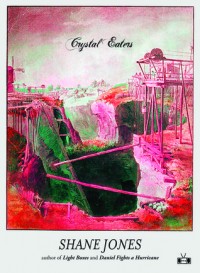 |
Crystal Eaters
by Shane Jones
Two Dollar Radio, 2014
172 pages / $16.00 buy from Amazon
|
Shane Jones,
To this day, I have still never seen these movies: Ray and Walk the Line. There are probably a few reasons why I haven’t, but one of the most important reasons concerns the fact that these movies were extremely hyped upon their release. Everyone was blowing their load. And by everyone, I guess I mean critics and my parents. So, I never saw them. I have a tendency to shy away from things that have received too much positive hype. I know myself and I can usually expect that I will be let down.
Crystal Eaters. I awaited the release of your book for months. And when it came out, I ordered it. And when it arrived at my house, I didn’t read it, at least not for a while. I wanted to pick it up and start it, but I kept seeing all of these intensely wordy and existential reviews popping up on Twitter (I’m reasonably new to Twitter). I usually don’t know what to make of intensely wordy and existential reviews, people who say that reading Crystal Eaters is like setting your brain adrift in the primordial muck of your ancestral wandering and watching it develop a higher consciousness as you stand stuck on the shore of your own punitive physicality. What?
I read it recently. I had high expectations. I’d never had a reading experience that was like tripping balls. I still haven’t. I don’t know that I want to trip balls when reading something. So, Crystal Eaters. It had one of the coolest concepts I had ever heard of, so naturally, while awaiting its release, I started to imagine what the book might be like. Months of imagining. It was like being in high school and idealizing the girl who has the locker across from you and finally having the chance to speak to her when you both find yourselves the last ones out the door from spanish club. And boom! You walk up with the perfect opening line only to hear her squeak one out because she doesn’t notice you coming and she’s never noticed you. All of this is to say that reading Crystal Eaters was nothing like a fart. It was a book that kept me up late. It frustrated me. I talked to my fiancé about it endlessly and now she is reading it because she wants to have a better idea of what I am talking about so we can discuss it further.
July 24th, 2014 / 1:07 pm
Crystal Eaters by Shane Jones
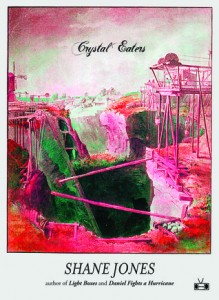 Crystal Eaters
Crystal Eaters
by Shane Jones
Two Dollar Radio, June 2014
202 pages / $16 Buy from Amazon or Two Dollar Radio
The first, most obvious observation to make about Shane Jones’ Crystal Eaters is that it begins with a countdown. Its first page is numbered 183, and it descends from there, 182, 181, 180, on and on, a timer that makes this novel feel like an unusually rigid experience, temporally speaking. After all, most books are objects that readers pick up and interact with on their own terms, at their own individual paces. Crystal Eaters’ countdown, however, makes the book feel fleeting. While in the midst of reading it, I imagined it still counting down even when sitting on my coffee table, closed—like I would eventually open it again only to find all its pages blank, its time expired.
Crystal Eaters focuses on a village that “survives on myth,” and Jones’ paginated countdown helps immerse the reader in the village’s central belief: that human beings are filled with crystals—100 at the time of birth—which crystals are then lost over the course of a life (bled out, vomited up, etc. etc.), until a person’s number reaches zero, and that person dies. The crystals are multi-colored, and Jones writes of village kids witnessing “their parents vomiting blue and yellow slush into kitchen sinks, toilets, couch cushions, their laps.” Illness in this book is surprising in its glowing, cotton-candy brightness. Almost psychedelic.
Jones’ cornerstone character—named Mom—is an example of psychedelic sickness. Shriveled by illness, Mom spews red everywhere at dinnertime. She’s down to her last few crystals, and she will die soon, a reality with which her family struggles. Her husband—named Dad—is aloof, trying to make the impending tragedy easy for everyone, but ultimately helpless against his wife’s disease. Their daughter—named Remy—believes that there must be a way to increase a person’s crystal count, thus staving off death. “The universe is a system where children watch their parents die,” perhaps, but not Remy: “She’ll save Mom from experiencing the number zero.”
A fourth character, however, expands the novel’s scope beyond the village. This character—Mom and Dad’s son, and Remy’s brother—is imprisoned, and his name is Pants McDonovan. (This may be the key question of my entire review: Do you or do you not want to own a novel that features a character named “Pants McDonovan”?) Pants used to be a revolutionary, waging a war against the unnamed metropolis that inches closer to the village each day (modernity threatening to engulf the village’s way of life). Now, Pants lingers in his cell, eating pieces of his secret stash of “black crystals.” No villager apart from Pants has ever seen a black crystal before; they exist as part of the larger system of myth that Jones suggests through his use of in-text citations, e.g., “His left eye drips crystal (Chapter 5, Death Movement, Book 8),” and, “the city has powers (Chapter 14, Resurrection, City Hospital Myth).” Remy thinks these black crystals might hold the secret to increasing Mom’s crystal count, but Pants, locked away from his family and unaware of the severity of Mom’s illness, uses the crystals in a different way: he ingests them to prompt hallucinations that help him escape the indignities of prison life.
April 14th, 2014 / 10:00 am
Made To Break by D. Foy
 Made To Break
Made To Break
by D. Foy
Two Dollar Radio, March 2014
242 pages / $16 Buy from Amazon or Two Dollar Radio
Friendship is a two-headed beast. As humans, our continuous need for interaction, communication, and companionship regularly clashes with fear of exposure, the sourness that comes from the inevitable accumulation of failures in life, and our proclivity toward pettiness when faced with frustrating situations. In Made To Break, author D. Foy explores the conflicting sides of amity as well as the unexplainable cohesive element that hides in the interstitial spaces between the good and the bad and ultimately holds friendships together.
Lucille wants to celebrate her new high-paying corporate job, so she decides to spend New Years’ Eve weekend drinking and getting high in a cabin in Lake Tahoe with Dinky, Andrew, Hickory, and Basil. When the five friends get there, there’s a dead caged bird filling Dinky’s family cabin with the smell of rot. Instead of taking it as a bad omen, the group starts talking about childhood pets and argue about who’s going to get ice. Dinky and Andrew end up having to leave the cabin despite that fact that weather forecasts warn of an impending flood. On their way to town, they crash their truck and Dinky is seriously injured. Broken and without ice, they finally encounter a strange man called Super who takes them back to the cabin. With the storm raging outside, no car, and the phone lines dead, the group turn to a game of Truth or Dare to help them pass the time until the sky clears and help can arrive. However, what starts as a game quickly transforms into a series of attacks, thinly veiled insults, and cruel accusations. Old wounds bleed again and new ones open up while weather conditions worsen and Dinky’s health deteriorates. Before the night is over, everyone will have to face, and question, themselves, death, and each other.
Nothing is what it seems to be in this narrative. There’s supposed to be a celebratory mood in the air, but hidden agendas, snarky comebacks, and the type of wittier-than-thou personalities that inevitably cause conflict whenever they’re put together give the novel a surprisingly oppressive and noirish atmosphere that it never shakes off. Andrew acts as narrator and slowly reveals his crush on Hickory and a romantic triangle between Dinky, Basil, and Lucille. With each revelation, a piece of each character is exposed, and they’re all flawed. While being imperfect is part of human nature, when flaws are exposed in public and boosted by vindictiveness, they become enlarged and serve only to inflame any situation and bring forth retaliation. Foy understands this, and so do his characters. However, knowing about it doesn’t stop them from repeatedly trying their best to eviscerate each other with words, fully aware of the fact that they’re using them as weapons and deriving a bizarre pleasure from it:
“There was that briefest moment of doubt where Basil and I considered exchanging our knives for guns or throwing the knives away. But really the doubt was feigned. We knew what would happen. The kill was just a dream. The sight of blood was enough. We were only after the blood. This of course was a perversion cultivated over time, like a taste for taboo food, monkey brain or mice. The satisfaction of knowing we’d wounded one another was more than sufficient. In fact, it had become for us a fix of sorts, why our hate for one another always equaled our need. Basil and I were Siamese twins parted only in flesh.”
April 7th, 2014 / 10:00 am
The Original Narrator No Longer Exists: An Interview with Jeff Jackson
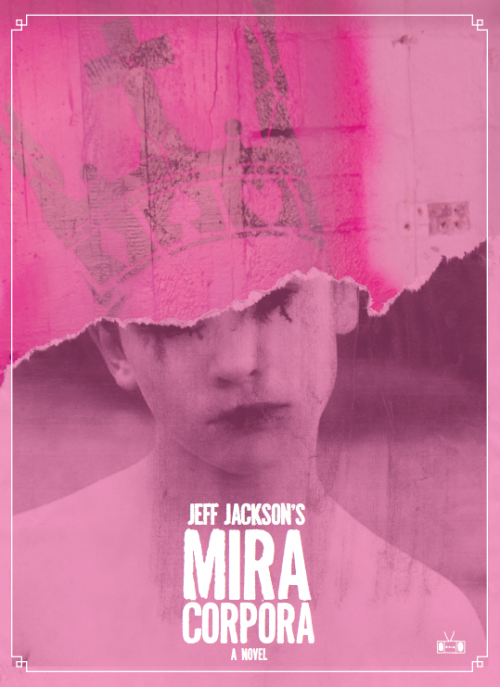
Jeff Jackson is the author of the novel Mira Corpora, just released from Two Dollar Radio. He holds an MFA from NYU and is the recipient of fellowships from the MacDowell Colony and Baryshnikov Center. His short fiction has been featured in Guernica, The Collagist, the anthology Userlands, and performed by New River Dramatists in New York and Los Angeles. Five of his plays have been produced by the Obie Award-winning Collapsable Giraffe company, including Botanica which was selected by New York Times as “one of the most galvanizing theater experiences of 2012.” Of Mira Corpora, Don DeLillo says this: “I hope the book finds the serious readers who are out there waiting for this kind of fiction to hit them in the face.” And Dennis Cooper says this: “Jeff Jackson is one of the most extraordinarily gifted young writers I’ve read in a very long time. His strangely serene yet gripping, unsettling, and beautifully rendered novel Mira Corpora has within it all the earmarks of an important new literary voice.”
Michael Kimball: I’m curious about the way the title and author are presented on the cover. It’s not “Mira Corpora” and then “Jeff Jackson” as it is on the spine. On the cover, it’s “Jeff Jackson’s Mira Corpora.” It’s something I’ve only seen with movie titles, I think, and I’m wondering how you decided on that particular presentation.
Jeff Jackson: Two Dollar Radio was apparently inspired by movie posters when they came up with that presentation. There wasn’t any conscious strategy behind it other than to create something that stood out. I can see how it invites a deeper reading, though. Early readers have said the book’s prose has a cinematic quality (and I’m a huge cinephile) and putting my name before the title seems to reference that the narrator shares my name.
The Doorknob Passage – A Conversation with Bennett Sims
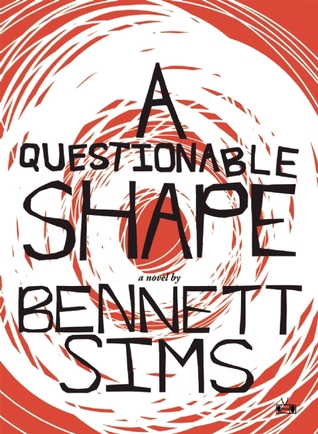
I’ve never read a zombie novel, and after reading A Questionable Shape, the debut novel from Bennett Sims, which has been described as a zombie novel, I still haven’t. We see glimpses of rabid zombies on grainy mall security cameras, ghost-like versions in a field, and zombies crowding a police car, but the book is more about retracing our memories, how to deal with loss, and ultimately, how to live in a world falling apart around us. It’s a philosophical mind-fuck of a novel filled with illuminating sentences and dark footnotes.
Bennett and I traded emails to discuss his time as a student of David Foster Wallace, paranoia, insecurities, influences, and push-ups.
Shane: So, how are you feeling?
Bennett: It’s the end of the semester, so I’m feeling somewhat hollowed out. This year I was teaching an undergrad fiction workshop here at the University of Iowa, and I wrapped up all my grading yesterday. Nabokov has that line about finishing a work, how he feels like ‘a house just emptied of its grand piano.’ It’s a little like that—except that instead of producing beautiful music, the part of me that’s missing is used to shooting off workshop letters and miscellaneous correspondence. So I guess I’m feeling like a house just emptied of its fax machine, which is a different kind of quietness. How are you feeling?
Shane: I’m depressed because I’ve been doing nothing but eating cookies and drinking coffee and now I’m crashing from it. I’ve never heard of that Nabokov line before but I like it. Pale Fire is a beast and my favorite of his. Did Nabokov influence A Questionable Shape? I see some of his wordplay and magic in your sentences.
Bennett: Sorry to hear about the cookie-and-coffee comedown. I usually have to take a nap when that happens.
Thanks for the kind words about the book. I’m flattered by the Nabokov comparison. He’s definitely a background influence—one of the stylists I’ve admired longest, whose sense of wordplay and whose sheer felicity of description I’ve tried to absorb. But I was not thinking about any particular work of his when drafting A Questionable Shape. The footnotes, for instance, were self-consciously modeled on Nicholson Baker’s The Mezzanine, rather than Pale Fire.
A Questionable Shape by Bennett Sims
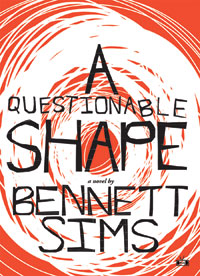 A Questionable Shape
A Questionable Shape
by Bennett Sims
Two Dollar Radio, May 2013
242 pages / $16.50 Preorder from Amazon or Two-Dollar Radio
This ain’t your granddaddy’s zombie-apocalypse. Everything in Bennett Sims’s stunning debut courts a topographical and invasive examination of the human condition through our inverse. The architecture of zombie-logic is rewired, and the undead become symbolic for what it means to exist in all its physical and existential, its beauty and brutality.
Post-Katrina. Docile shapes fringe the horizon of greater Baton Rouge. Hurricane season looms yet again, threatening the security of Mississippi barges that quarantine thousands of zombies. If the barges breach, a second epidemic is likely. A Questionable Shape follows Vermaelen over one week as he helps his friend, Matt Mazoch, search for his undead father, retracing “haunts” Mr. Mazoch might return to in his zombified state. But hurricane season is also dwindling the window of opportunity to find him.
Sims escalates the psychological state of the undead, giving them, essentially, purpose. Reanimated, these zombies pursue places from memories. Reanimation, thus, becomes a kind Resuscitation. What the genre formerly defined as a vacant shell of rudimentary desire, Sims infuses with recollection, humanizing the traditionally dehumanized.
“What we know about the undead so far is this: they return to the familiar. They’ll wander to nostalgically charged sites from their former lives, and you can somewhat reliably find an undead in the same places you might have found it beforehand. Its house, its office, the bikelanes circling the lake, the bar. ‘Haunts.’ … In fact, what it calls to mind are those homing pigeons, the ones famous and fascinating for the particles of magnetite in their skulls: bits of mineral sensitive to electromagnetic pulls and capable of directing the pigeons, like the needle of a compass, homeward over vast and alien distances. It is as if the undead are capable of ‘homing’ in this way.”
“…our ‘walking dead’ don’t simply walk: anytime an undead is walking, what it’s really doing is remembering. It’s retracing steps from its former life and moving blindly along a vector of memory. In this way, the tracks that it leaves (of rainwater, of dirt across a carpet, of blood) record more than a physical path: they also materialize a line of thought, the path of that remembering.”
April 15th, 2013 / 12:00 pm
Crapalachia: A Biography of a Place by Scott McClanahan
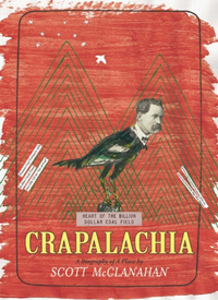 Crapalachia: A Biography of a Place
Crapalachia: A Biography of a Place
by Scott McClanahan
Two Dollar Radio, March 2013
192 pages / $16 Buy from Amazon or Two Dollar Radio
To me Rainelle, West Virginia is synonymous with snow days. When I was growing up on Muddy Creek Mountain outside Alderson, listening to early morning school cancelations on 99.5 The Big Dawg In Country, it seemed like the kids in Rainelle always got the day off. Rainelle was in the same county as the town I went to school in but it lay just far north enough to ensure that it got an icing thick layer of snow on days when we got only dustings. As I walked to meet the school bus I thought about all those lucky-son-of-a-bitch kids in Rainelle at home in their pajamas watching T.V.
Rainelle is the hometown of Scott McClanahan and though I have never met him, part of the magic that McClanahan weaves into all of his writing is his ability to make you feel that you have known him all your life.
Rainelle is the setting for most of McClanahan’s stories, that and Danese, an even smaller community which serves as the main setting for his newest book Crapalachia: A Biography of a Place. Rainelle and Danese, the names, like those of two mythical twins, ring with memories and meanings just out of reach. Names are important to McClanahan, the names of his Grandma Ruby’s 13 children (each and every name ended in Y), the names of the 11 siblings of McClanahan’s grandfather (5 of whom killed themselves), the names of the faraway places the family moved off to, the names of the people etched onto McClanahan’s own heart.
It is McClanahan’s heart that speaks most loudly in Crapalachia. Though his prose often leans on the side of overly simple and abruptly declarative, the beauty in the writing comes from the fact that McClanahan seems to be dictating his very pulse. And in the midst of reading it you begin to realize that his pulse is matched by your own, that the room is filled with beating hearts, his, yours, and those of all of your mingled memories and “a million crazy babies.” Most importantly, McClanahan seems to be saying, he is alive and so are you and despite all odds so is this ageless place he calls Crapalachia. It is the defiance in the writing that is breathtaking, the very aliveness of this voice in the face of all those dead: the thousands and thousands of dead miners, the dead of the Hawk’s Nest Tunnel, the dead of the Sago Mine Disaster, the dead of the Buffalo Creek Flood, the dead of hunger, the dead of a death by their own hands.
April 1st, 2013 / 12:00 pm
How to Get Into the Twin Palms & Radio Iris
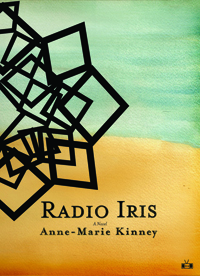 How to Get Into the Twin Palms
How to Get Into the Twin Palms
by Karolina Waclawiak
Two Dollar Radio, July 17, 2012
192 pages / $16 Preorder from Two Dollar Radio
&
Radio Iris
by Anne-Marie Kinney
Two Dollar Radio, May 2012
208 pages / $16 Buy from Two Dollar Radio or Amazon
When I was a teenager, I didn’t understand feminism and thought feminists were whiny and annoying. I know from teaching freshman undergrads that this is a common way of thinking. We are told we are a progressive society—sexism and racism are things of the past. I grew up in a household with an Italian matriarch grandmother who regularly attacked my grandfather with household kitchenware. My father was a truck driver and my mother had a graduate degree and made all the money, so it seemed to me that the women were the ones with the power. I didn’t notice the rest of what was going on around me. I thought it was normal to stay with abusive men, men who didn’t come home, who had women on the side, who broke plates over your head. I thought that braving through abuse is just what we, as women, must do. If anything goes wrong, it is the woman’s fault, because men will do what they will. The woman’s job is to stay.
When boys bashed my head into the walls at school, they would hold my neck against the cold tile and ask me, “Does it hurt?”
“No.” I’d say. Steely like I didn’t care. “It doesn’t hurt.”
Every so often I will feel a little pool of hunger open up in me, and the only thing that can quell this need are books by women, about women. There is something that is wanting and it has nothing to do with men. I need a safe space where the line between the story and me is permeable. When I am in these moods, I will trust the author more if she is a woman, in the same way I don’t want someone who doesn’t also have curly hair to cut my hair. I want the person who conceives the book to know me, to know what being a woman is. This is not to say that I don’t think men should write books about women or women should write books about men. I think they should and of course I will read them—we all do. The beautiful thing about writing or reading is the discovery of a life other than your own. Sometimes, though, there are pieces of me that need speaking to, and the timbre of the voice comes from the magical synthesis of me, a woman, reading a book by a woman about a woman.
June 11th, 2012 / 12:00 pm
